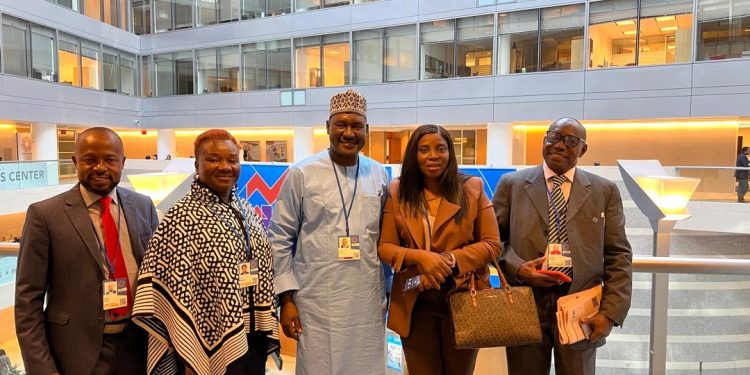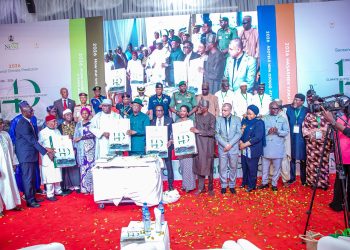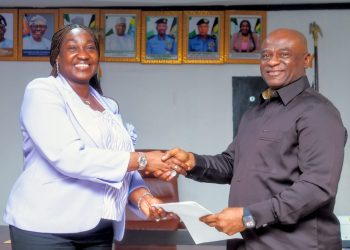By Nkechi Eze
Nigerian civil society leader and Executive Director of the Civil Society Legislative Advocacy Centre (CISLAC), Auwal Musa Rafsanjani, has called for urgent reforms in global financial governance and Africa’s debt management systems, warning that the continent faces a worsening fiscal crisis that demands immediate international and domestic action.
Speaking during The Policy with Leah, a Nigerian current affairs programme hosted by Leah Katung Babatunde, on the sidelines of the 2025 Annual Meetings of the International Monetary Fund (IMF) and the World Bank in Washington D.C., Rafsanjani, who also heads Transparency International Nigeria, described the debt trajectory of many African nations particularly Nigeria as reckless and unsustainable.
He lamented that most of Nigeria’s borrowings were being channelled into recurrent expenditure rather than productive investments that could generate growth, employment, and sustainable development.
“Most of the loans we take are not for development but for consumption,” Rafsanjani said. “There is little or no accountability around them. Civil society must be involved in monitoring these debts, especially when even lawmakers lack access to full disclosure.”
The activist threw his weight behind global calls for debt cancellation, especially in cases where loans have failed to yield tangible development outcomes. He aligned with the recent position of the G24, which described the current debt trap faced by developing nations as a structural injustice that perpetuates poverty and dependency.
According to him, Africa’s growing fiscal vulnerability is deeply rooted in weak governance, endemic corruption, and unregulated illicit financial flows that drain the continent’s resources. Rafsanjani also echoed calls for deep-seated reforms within the IMF and World Bank systems, condemning what he termed the “disproportionate influence” of powerful countries over decision-making in those institutions.
He stressed that global financial systems must become more transparent, inclusive, and equitable if developing countries are to have a fair chance at achieving economic stability and growth.
Turning his attention to Nigeria, Rafsanjani expressed deep concern about the country’s overreliance on oil revenue, deteriorating infrastructure, and persistent insecurity, which he said continue to repel investors and stifle productivity.
He criticised the government’s withdrawal of subsidies in critical sectors such as healthcare, education, and transportation, arguing that these austerity measures have only worsened poverty and widened inequality.
“It is ironic that while developed nations continue to subsidize critical services, we are removing support for the poor under the guise of reforms,” he said.
Rafsanjani warned that Nigeria’s economic policies must be human-centred, with a focus on strengthening education, science, and technology. He cautioned that without strategic investment in these areas, the country risks being left behind in the emerging global digital economy.
“Without quality and affordable education, our youths cannot compete in the digital economy,” he said. “Our universities are underfunded, research is dead, Professors and lecturers are continually finding it hard to survive and laboratories are non-functional.”
He further advocated for the adoption of Artificial Intelligence (AI) tools by governments to enhance accountability and fiscal transparency. According to him, technology can revolutionise public finance management by improving expenditure tracking, automating auditing processes, and preventing leakages before they occur.
For Nigeria to benefit from this digital transformation, Rafsanjani said government must invest in energy infrastructure, digital systems, and skilled manpower to support technology-driven governance.
On domestic fiscal policy, the CISLAC boss urged state governors to increase their internally generated revenue (IGR) through innovation and efficiency rather than depending solely on allocations from the Federation Account Allocation Committee (FAAC).
He warned that the recent increase in FAAC allocations should translate into tangible improvements in the lives of citizens, rather than being diverted into “elephant projects” or luxury expenditures.
“The fuel subsidy savings must also be transparently accounted for by governors,” he said. “These funds belong to the people and must be used to improve healthcare, education, and infrastructure, not to enrich political elites.”
Rafsanjani decried the high cost of governance in Nigeria and condemned what he described as the extravagant lifestyle of many public officials. Drawing comparisons with public servants in developed countries, he said Nigerian leaders must lead by example in prudence and accountability.
“You cannot expect development assistance from abroad while living lavishly at home,” he said. “Ministers abroad fly economy class; in Nigeria, one official moves with 20 cars. That kind of waste is unsustainable.”
He concluded by urging African governments to prioritise sustainable development financing, institutional accountability, and human capital growth. Without comprehensive fiscal and governance reforms, he warned, the continent risks remaining trapped in a cycle of poverty, debt dependency, and underdevelopment.
Rafsanjani’s remarks add to a growing chorus of civil society voices demanding structural change as global finance leaders deliberate on the economic challenges facing the Global South at the ongoing IMF and World Bank meetings in Washington.

















